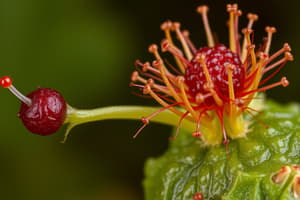Podcast
Questions and Answers
Explain the concept of inherited microbiota in the context of plant-microbe interactions.
Explain the concept of inherited microbiota in the context of plant-microbe interactions.
Inherited microbiota refers to the microbial taxa present in seeds that have co-evolved with the host plant species to provide growth traits for plant survival. These seed-borne microbes may act as a primary inoculum for plants, displaying variability, presence, and resilience, and may include both beneficial and pathogenic microorganisms.
What is the significance of seed microbiota for plant survival and development?
What is the significance of seed microbiota for plant survival and development?
Seed microbiota represents a reservoir of microbial taxa that has co-evolved with the host plant species to provide special growth traits for plant survival. These microbes can act as a primary inoculum for plants, contributing to their resilience and variability.
Discuss the relationship between seed-borne microorganisms and seedlings.
Discuss the relationship between seed-borne microorganisms and seedlings.
While seed-borne microorganisms may provide special growth traits for plant survival, it is not necessary that they will colonize seedlings. The seed-borne microorganisms must display great physiological adaptation capacity to the changing conditions encountered during seed germination.
What are the characteristics of seed-associated microbiota?
What are the characteristics of seed-associated microbiota?
How does the variability of seed-borne microbiota impact plant phenotypes?
How does the variability of seed-borne microbiota impact plant phenotypes?
What is the role of seed microbiota in plant survival and development?
What is the role of seed microbiota in plant survival and development?
What are the characteristics of seed-associated microbiota?
What are the characteristics of seed-associated microbiota?
Explain the concept of inherited microbiota in the context of plant-microbe interactions.
Explain the concept of inherited microbiota in the context of plant-microbe interactions.
What challenges must seed-borne microorganisms overcome during seed germination?
What challenges must seed-borne microorganisms overcome during seed germination?
What is the significance of the variability of seed-borne microbiota for plant phenotypes?
What is the significance of the variability of seed-borne microbiota for plant phenotypes?
Flashcards are hidden until you start studying




